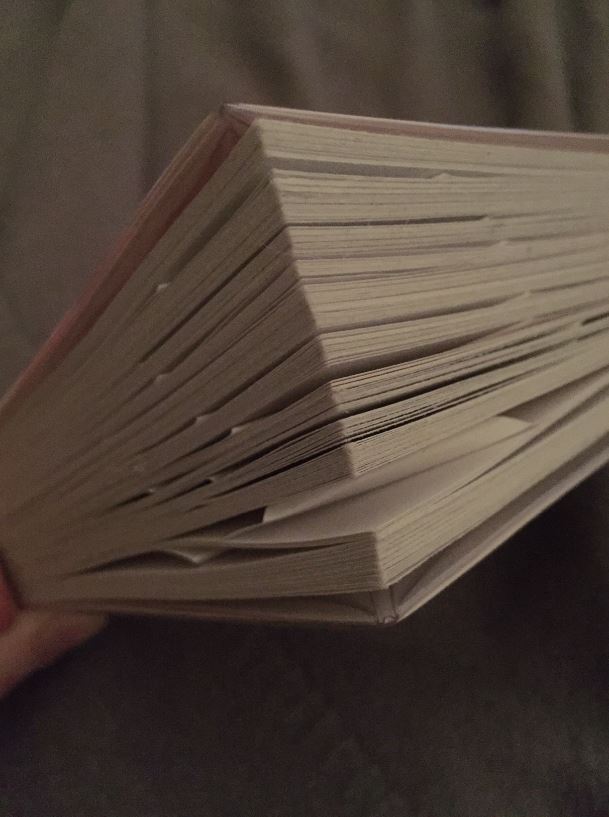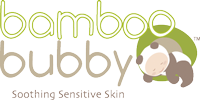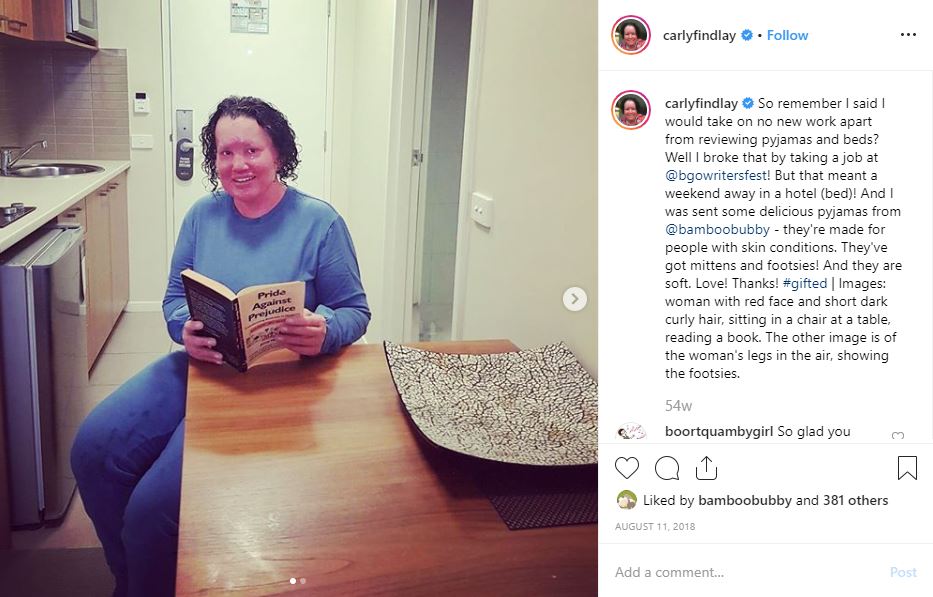Book Review of 'Say Hello' by Carly Findlay
Posted by Kelly Northey on 25th Aug 2019
Over the years here at Bamboo Bubby we've had a number of customers who've purchased our products to help provide a bit of relief for their kids who have ichthyosis (pronounced ik-thee-o-suhs), which is what made me recently pickup a copy of Carly Findlay's newly published book 'Say Hello', thinking that it'd be a way to learn more about the skin conditions like ichthyosis that Carly was born with too. I was lucky enough to 'meet' Carly online through a Facebook business group a couple of years ago, where I knew about her as a writer and then through following her Instagram page, where I always admire the way she writes and positively manages this presence!
Carly also kindly agreed to tried out a pair of our bamboo pajamas & modeled them during some R&R time while she was away for a writer's festival recently, so even before spending some time last weekend, similarly rugged up in my own bamboo PJs and settling down to 'Say Hello', I did feel like I already knew Carly a little bit.

Of course, hearing Carly's story of growing up with icthyosis did give insight like I expected into what it's like growing up with this type of skin condition and sheer amount of daily, ongoing management it takes to keep it under control.but WOW - what I didn't expect from this book was ALL the 'met too' moments I had while reading it and ALL that pages I had to mark to go back and take in properly afterwards that really give me a whole new perspective of living with a severe skin condition and facial difference or disability that I'd never considered like this!
Lessons on 'being an inspiration'...
After reading the daily, ongoing challenges Carly faced throughout her life not only in the management of her skin condition, but also the outright rudeness and discrimination she's faced and continues to, I I found it hard NOT to feel inspired by her and admire how despite copping thoughtless, negative words and actions, that she so actively and positively continues to educate the wider community about people living & thriving with debilitating conditions and facial differences. However, after reading this book I can also now understand why the word 'inspiration' is problematic for disabled people.
"I know that people who call me an inspiration are well intended. They think it's a compliment. But for me, and for other disabled people, the word 'inspiration' can be tricky. Non-disabled people often call us an inspiration for doing not very much. That's because expectations of disabled people are so low." (p17).
Sorry though Carly, I DO think you're an inspiration but not because my expectations are low - but because I am a mother of an eczema baby/child and I KNOW how exhausting managing that was, let alone a more severe skin condition like ichthyosis. I'm inspired thought too, because it takes real guts to stand up to people who belittle others and discriminate because of appearances and not just accept it as how people are and move on or try to compensate by continually trying to prove yourself to these people to be smarter, funnier, whatever-er!
Reading some of the accounts of discrimination Carly faced actually made me realise too that I've faced on some level this type of negativity and discrimination throughout my own life too, but that before hearing of her term 'facial differences' in this book, I'd just never fully realised that this IS what it was! I was born with a cleft lip and while I've always considered myself lucky. It was repaired really well as a baby and I've not really had to have anything much else done since. While most of the time people will say 'ohh I didn't even notice' (even though they HAVE to have), I am conscious of this difference every day and have felt the sting of applying jobs in the past and told 'you don't have the right look for this job' (serving icecream!!) or felt too I've had to always be the smart one to counteract for fact that I might look different to others, as if I need to make up for something that others don't.
So thankyou Carly for putting the term 'facial difference' out there to the world and making it a topic of conversation so people can hopefully start to realise that we all 'look different' in some way and that it doesn't and shouldn't affect how we work or what we deserve in this life!
Lessons on 'hope'...
As an eczema parent and now one too who provides products to families hoping to provide relief to people suffering a skin condition, the topic of hope and what it means to disabled people also in also interests me too. The eczema market in particular is FULL of miracle creams and promises of a miraculous recovery and every day I hear from people who spend A LOT of money on the next promise of hope. I'm also regularly in contact too with parents who 'wouldn't wish this condition on my child or anyone else' and who are angry or even in denial that their child's skin is less than perfect. Sometimes they're so in denial that something 'isn't right' with their child that they're not even willing to try a solution like a Bamboo Bubby product that works in-conjunction with other treatments to help give some relief, hopefully helping a lot along the way, but that ISN'T necessarily a miracle cure. It's this that I always struggle to understand. I would have tried anything that might help give my child some relief while we were working out how to manage his condition.
I hope that these parents can pickup a copy of Carly's book and take away the messages she's written about hope, because she too has found that 'when parents talk about hope for their child, they're often talking about their child's disability disappearing. They hope for a life without disability. They long for cures, fixes and normality. Hope it tied to fixing the body, wishing away the reality of disability. But the reality is, most impairments are here to stay.' (p.62-63).
I love that Carly's view on hope is more focused on questioning the fact that 'what if hope is accepting disability and focusing on interests and achievements and wider life? What is hope was connecting with others who have similar impairments? What is hope was finding role models - other people with the same impairment, or disability activists, creatives and leaders [who] have lived or are living great lives, and are changing lives'.
I have to agree with Carly - THAT'S REAL HOPE!
Lessons to teach our children...
While there's still so many other aspects of 'Say Hello' that I feel are important and really resonated with me, I have to say that as an eczema parent and a person with a facial difference myself, it's the section Carly writes about what to say to a person with a visible difference that for me outlines some of the most vital things we need to be teaching our children. Probably because of my own experiences and then that of having a baby/child with eczema, I think I've always tried to instilled an empathetic outlook in my own child and have always been proud of how from an early age he was always so inclusive of others who appear different, often too choosing friends who were going through periods of difficultly whatever they might have been, visible or otherwise.
So again, I find it difficult to fathom how words and actions like Carly suggests are not just common sense for everyone, but the fact that discrimination and rudeness still exists means that it musn't be and so I believe strongly that we should all be passing these messages on wherever and however we can - and how I'm able to is here through this blog....
- Tell your child that everyone is different.
That we are ALL born different with differing features, eye colour, hair colour, skin types and colour and differences in appearances. - Tell the truth, even if you don't know the answer.
Don't make up a reason for a person's difference. It's better to actually tell you're child you don't know and perhaps even ask the person to explain it themselves if you're able to. Carly suggests simply saying Hello, followed by 'I hope you don't mind me asking...' as a way to start this conversation. However, it's also important to remember not to be offended if a person doesn't want to explain their difference to you. It could be that you've taken them by surprise or that they are exhausted by people asking.
I've found with my child that Googling a condition later together is a great way to learn more and discuss. - Teach your child to respect people, no matter how they look.
Teach them that applying manners to everyone they meet in the world is important, no matter what they look like and that it's never ok to stare or laugh at someone or make negative, rude or cruel and hurtful comments).
The most important and only way to speak to anyone is to start by saying hello, because you just never know where a conversation can lead!
(p.258-259)
THANK YOU Carly for writing this book - I know you did it because it's the book that you would have wanted your own young self to read and I certainly wish it had been around a long time ago too.
Thank you for doing it now, so that it's now in circulation to help so many others of all ages and not just those with ichthyosis forevermore...
'Say Hello' is a must-read for everyone, click here find the best way to grab a copy now or simply have a further read of Carly's blog or social media pages.


